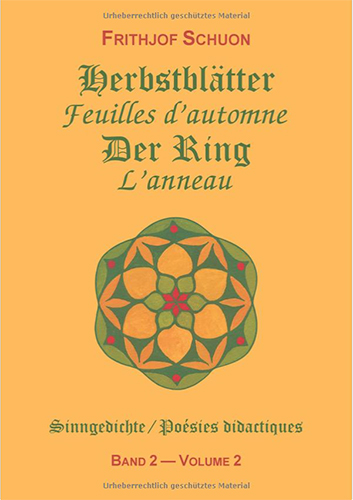
Frithjof Schuon Archive

Briefe
| Titel | Zusammenfassung | Publication Data | Dated |
|---|---|---|---|
| Extract from a letter from Frithjof Schuon | Regarding the question of transubstantiation, which I address briefly in Logic and Transcendence, the Oriental character of the words in question can be seen in their use of ellipsis: Christ did not say, “I am like a vine, like a door”, but he said, “I am the vine, the door”; likewise he did not say, “This conveys divine power in the same way my body conveys divine power”, but he said, “This is my body”. | Logic & Transc. p.237 | 02/01/1976 |
| Extract from a letter from Frithjof Schuon | One should not reproach a science for not being what it does not want to be or for not providing what it does not want to provide. In this respect one should not criticize modern chemistry insofar as it studies the phenomena it intends to study, for on its limited plane it remains within adequation and is not exceeding its strengths; nor can one blame it for remaining within the strictly human perspective in relation to matter, for it need not go beyond this point, and indeed no physical science needs to do so. | Logic & Transc. p.235 | 06/22/1964 |
Featured Books
Poésies didactiques, tome 2 : Feuilles d’automne – L’Anneau (zweisprachige Ausgabe in Französisch und Deutsch) (Taschenbuch)
Frithjof Schuons deutsche Gedichte bilden eine metaphysische und spirituelle Summe, die die Essenz der Lehre dieses Meisters in einer Form zusammenfasst, die sowohl zugänglich als auch direkt ist.
Featured Poems
Adastra and Stella Maris: Poems by Frithjof Schuon-Symbolism
A black holy man once said to me,
Adastra and Stella Maris: Poems by Frithjof Schuon-Sacrifice
It is strange that in all religions
Adastra and Stella Maris: Poems by Frithjof Schuon-Tantra
When thou seest the True in Mâyâ’s play:
Featured Articles
Book Review of “In the Tracks of Buddhism”
Christopher Woodman reviews Frithjof Schuon’s In the Tracks of Buddhism, discussing both the material of the book and the difficult language it is presented in. Woodman calls the book “as difficult as it is important” and “uncompromising”; deeply informative and deeply challenging, the latter due to the terse wording which forces the reader to pay rapt attention. According to Woodman, the book assumes a certain familiarity with Buddhism on the part of the reader, with the exception of the traditions of Jodo and Shinto which are gone into in detail and explained assuming a poorer understanding.
